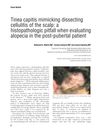Search
for
Sort by
Research
900-930 / 1000+ results
research Female Pattern Hair Loss
Over 50% of women over 50 experience hair loss, with minoxidil being the only proven effective treatment.

research Disorders of Hair in Children
The document concludes that accurate diagnosis and understanding the type of hair disorder are crucial for treating hair loss in children.

research Secondary Cicatricial and Other Permanent Alopecias
The document concludes that permanent hair loss conditions are complex, require early specific treatments, and "secondary permanent alopecias" might be a more accurate term than "secondary cicatricial alopecia."

research Hair Restoration Surgery Through Micrografting Techniques
Micrografting is the most effective surgical method for permanent hair restoration.

research An Overview of Management of Drug-Induced Hair and Nail Disorders
Cooling the scalp may prevent hair loss from chemotherapy, hair often grows back after treatment, and nail issues usually improve after stopping the drug.

research Hair Transplantation in Cicatricial Alopecia
Hair transplants can work for permanent hair loss if the condition is stable and done carefully.

research Primary Scarring Alopecias
The document concludes that primary scarring alopecias cause permanent hair loss, have unpredictable outcomes, and lack definitive treatments, requiring personalized care.

research Types and Treatment of Hair Loss in Men and Women
The article concludes that different types of hair loss require specific treatments and psychological support is important.

research Hair Loss And Its Management In Children
The document concludes that early diagnosis and a comprehensive treatment plan are crucial for managing hair loss in children, with a focus on both medical and psychological support.

research Guidelines of Care for Superficial Mycotic Infections of the Skin: Tinea Capitis and Tinea Barbae
Treat scalp and beard fungal infections early with oral antifungal medication and sometimes topical therapy, avoiding unnecessary allergy tests and surgery.

research Hirsutism
Hirsutism is often caused by high male hormone levels and can be treated with lifestyle changes and medications.

research Hirsutism: Diagnosis and Treatment
The document concludes that proper diagnosis and combined treatments are key for hirsutism management, and weight loss may help overweight patients.

research Hair Follicles, Their Disorders, and Their Opportunities
Hair follicles offer promising targets for delivering drugs to treat hair and skin conditions.

research Hair Restoration Surgery: Challenges and Solutions
Hair restoration surgery effectively treats hair loss with natural-looking results, using techniques like stem cells and platelet-rich plasma.

research Hair Loss and Hair Restoration in Women
Hair loss in women is complex to diagnose and treat, and hair restoration should be done by experts. Using minoxidil before surgery can help manage post-surgery hair shock loss. The Follicular Unit Transplantation method is recommended for women due to its speed, no need for shaving, and better graft quality. Strategies like L, T, and reverse L patterns can help restore central hair density, and regenerative methods can improve graft survival in hair transplants.

research The Role of Dietary Supplements in Hair Loss Treatment: A Review of Evidence
Some supplements may help with hair loss, but there's not enough strong evidence to recommend them without doctor advice.

research Hair and Cancer Chemotherapy: Consequences and Nursing Care - A Literature Study
Chemotherapy-induced hair loss significantly affects patients' well-being, and nurses are key in helping them cope, but more research is needed to find effective treatments.

research Normal and Aging Hair Biology and Structure: Aging and Hair
Hair gets thinner, grayer, and changes texture with age due to genetics, environment, and cellular changes, affecting the growth cycle.

research Selected Topics in Pediatric Hair Loss
The document concludes that early diagnosis and treatment are key for pediatric hair loss disorders, and addressing the emotional effects on children is important.

research Acquired Scalp Alopecia: A Review
Accurate diagnosis is key for treating different kinds of hair loss, and immune response variations may affect the condition and treatment results.

research Scalp Reduction in the Treatment of Androgenic Alopecia
Scalp reduction can treat severe hair loss, but success depends on scalp flexibility and it may cause complications like pain, infection, and cosmetic issues.

research Central Centrifugal Cicatricial Alopecia: Past, Present, and Future
CCCA is a hair loss type affecting African women, possibly caused by grooming and chemicals, with various treatments and needing more research.

research Factors Affecting the Severity of Central Centrifugal Cicatricial Alopecia
Longer hair loss leads to more severe CCCA; early treatment and avoiding damaging hairstyles help regrowth.

research Biomedical Versus Cultural Constructions of Abnormality: The Case of Idiopathic Hirsutism in the United States
The perception of excessive hair growth in women as abnormal is more influenced by cultural norms than by medical reasons.

research Mucocutaneous Reactions to Chemotherapy
Chemotherapy can cause various skin reactions, with hair loss being the most common, and proper diagnosis and treatment of these reactions are important.

research Follicular Unit Extraction: A Comprehensive Overview of Techniques and Best Practices
FUE provides minimal scarring and quick recovery in hair transplantation, and surgeons not using it may lag in technology.

research Proprietary Herbal Extract Downregulates the Gene Expression of IL-1α in HaCaT Cells: Possible Implications Against Nonscarring Alopecia
A herbal extract may help treat certain types of hair loss by reducing a specific gene's activity.

research Tinea Capitis Mimicking Dissecting Cellulitis of the Scalp: A Histopathologic Pitfall When Evaluating Alopecia in the Post-Pubertal Patient
A fungal infection can look like a different scalp condition in teens, leading to wrong treatment until proper tests are done.

research Bureau of Legal Medicine and Legislation
Companies agreed to stop false advertising about their products' health benefits.